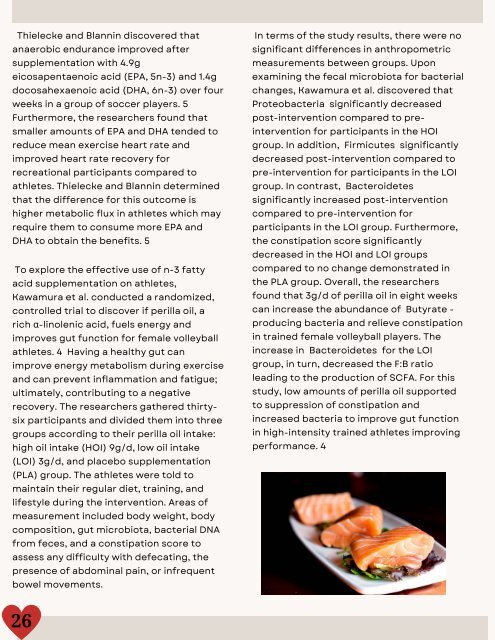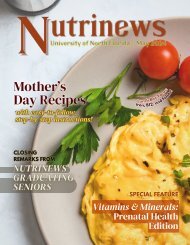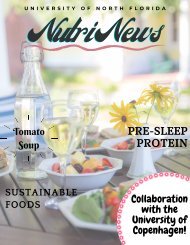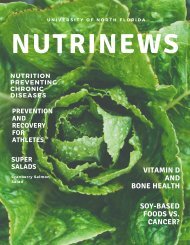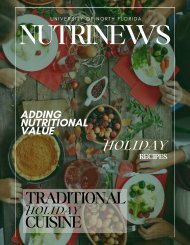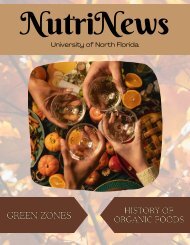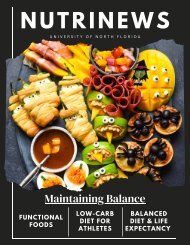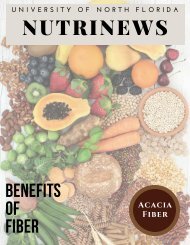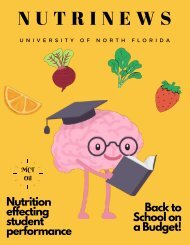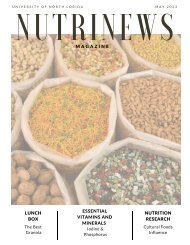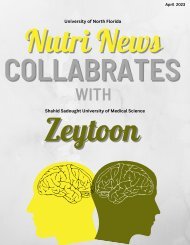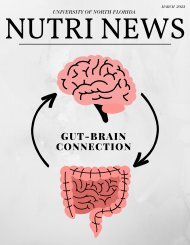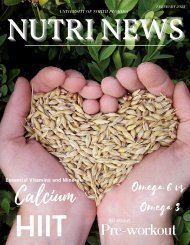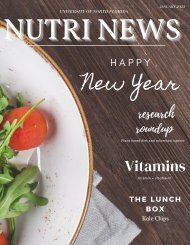February Issue 2024
This month the theme of our issue is Young at Heart. February is here and that means heart health month is too! In this issue of NutriNews we focus on nutrition and heart health. Lifestyle and nutrition play a significant role in our health, especially when it comes to the heart.
This month the theme of our issue is Young at Heart. February is here and that means heart health month is too! In this issue of NutriNews we focus on nutrition and heart health. Lifestyle and nutrition play a significant role in our health, especially when it comes to the heart.
Create successful ePaper yourself
Turn your PDF publications into a flip-book with our unique Google optimized e-Paper software.
Thielecke and Blannin discovered that<br />
anaerobic endurance improved after<br />
supplementation with 4.9g<br />
eicosapentaenoic acid (EPA, 5n-3) and 1.4g<br />
docosahexaenoic acid (DHA, 6n-3) over four<br />
weeks in a group of soccer players. 5<br />
Furthermore, the researchers found that<br />
smaller amounts of EPA and DHA tended to<br />
reduce mean exercise heart rate and<br />
improved heart rate recovery for<br />
recreational participants compared to<br />
athletes. Thielecke and Blannin determined<br />
that the difference for this outcome is<br />
higher metabolic flux in athletes which may<br />
require them to consume more EPA and<br />
DHA to obtain the benefits. 5<br />
To explore the effective use of n-3 fatty<br />
acid supplementation on athletes,<br />
Kawamura et al. conducted a randomized,<br />
controlled trial to discover if perilla oil, a<br />
rich α-linolenic acid, fuels energy and<br />
improves gut function for female volleyball<br />
athletes. 4 Having a healthy gut can<br />
improve energy metabolism during exercise<br />
and can prevent inflammation and fatigue;<br />
ultimately, contributing to a negative<br />
recovery. The researchers gathered thirtysix<br />
participants and divided them into three<br />
groups according to their perilla oil intake:<br />
high oil intake (HOI) 9g/d, low oil intake<br />
(LOI) 3g/d, and placebo supplementation<br />
(PLA) group. The athletes were told to<br />
maintain their regular diet, training, and<br />
lifestyle during the intervention. Areas of<br />
measurement included body weight, body<br />
composition, gut microbiota, bacterial DNA<br />
from feces, and a constipation score to<br />
assess any difficulty with defecating, the<br />
presence of abdominal pain, or infrequent<br />
bowel movements.<br />
In terms of the study results, there were no<br />
significant differences in anthropometric<br />
measurements between groups. Upon<br />
examining the fecal microbiota for bacterial<br />
changes, Kawamura et al. discovered that<br />
Proteobacteria significantly decreased<br />
post-intervention compared to preintervention<br />
for participants in the HOI<br />
group. In addition, Firmicutes significantly<br />
decreased post-intervention compared to<br />
pre-intervention for participants in the LOI<br />
group. In contrast, Bacteroidetes<br />
significantly increased post-intervention<br />
compared to pre-intervention for<br />
participants in the LOI group. Furthermore,<br />
the constipation score significantly<br />
decreased in the HOI and LOI groups<br />
compared to no change demonstrated in<br />
the PLA group. Overall, the researchers<br />
found that 3g/d of perilla oil in eight weeks<br />
can increase the abundance of Butyrate -<br />
producing bacteria and relieve constipation<br />
in trained female volleyball players. The<br />
increase in Bacteroidetes for the LOI<br />
group, in turn, decreased the F:B ratio<br />
leading to the production of SCFA. For this<br />
study, low amounts of perilla oil supported<br />
to suppression of constipation and<br />
increased bacteria to improve gut function<br />
in high-intensity trained athletes improving<br />
performance. 4<br />
26


